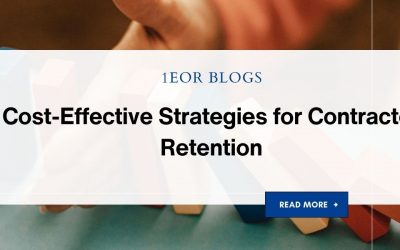Managing human resources in a fast-paced business world can be overwhelming. From handling payroll to ensuring compliance with labor laws, HR responsibilities are both extensive and complex. Streamlining HR processes with an Employer of Record (EOR) offers an efficient solution for businesses looking to expand globally, manage compliance, and reduce administrative burdens. By outsourcing HR functions to an EOR, companies can focus on their core objectives while ensuring legal and operational efficiency. Transform your HR efficiency today by partnering with 1EOR, the ultimate Employer of Record solution, and simplify your global workforce management!
In this article, we will explore how an Employer of Record (EOR) helps businesses streamline HR processes, improve efficiency, and ensure compliance. We will also discuss the benefits, challenges, and considerations when choosing an EOR partner.
What is an Employer of Record (EOR)?
An Employer of Record (EOR) is a third-party service provider that takes responsibility for all HR-related tasks, including payroll, employee benefits, tax compliance, and labor law adherence. The EOR legally employs workers on behalf of a company, allowing businesses to expand into new markets without establishing a local entity.
Key Responsibilities of an EOR:
- Payroll Processing – Ensures accurate and timely employee salary payments.
- Compliance Management – Adheres to local labor laws, taxes, and employment regulations.
- Employee Benefits Administration – Manages health insurance, pension plans, and other benefits.
- Tax and Legal Compliance – Handles tax filings and statutory deductions.
- Onboarding and Offboarding – Manages hiring, contract creation, and termination procedures.
Using an EOR helps businesses scale quickly and efficiently, minimizing legal risks while ensuring smooth HR operations.
Why Businesses Need to Streamline HR Processes
HR management can be a time-consuming and costly process, especially for businesses operating in multiple countries. Traditional HR models often lead to inefficiencies, legal complications, and high administrative costs. Streamlining HR processes with an Employer of Record eliminates these challenges by offering a centralized, automated, and compliant HR solution.
Challenges of Traditional HR Management:
- Complex Compliance Regulations – Each country has unique labor laws, making compliance a significant challenge.
- Time-Consuming Paperwork – Handling payroll, contracts, and tax filings manually can slow down operations.
- High Operational Costs – Setting up a local entity requires significant financial investment.
- Employee Experience – Poor HR management leads to low employee satisfaction and retention issues.
An EOR eliminates these inefficiencies by providing a streamlined and automated HR framework, enabling businesses to focus on growth.
How an Employer of Record Streamlines HR Processes
Partnering with an Employer of Record simplifies HR management through automation, compliance support, and cost-effective solutions. Here’s how an EOR helps businesses achieve seamless HR operations:
1. Efficient Payroll and Tax Management
An EOR ensures accurate payroll processing and tax compliance. By leveraging automated payroll systems, businesses can reduce errors, ensure timely salary disbursement, and adhere to tax regulations across multiple regions.
2. Legal and Regulatory Compliance
One of the biggest challenges in HR management is maintaining compliance with local labor laws. An EOR takes full responsibility for employment laws, work permits, tax regulations, and statutory benefits. This reduces the risk of legal disputes and ensures that businesses operate within legal boundaries.
3. Simplified Hiring and Onboarding
Hiring employees in different countries requires navigating complex legal frameworks. An EOR streamlines the hiring process by handling employment contracts, onboarding procedures, and work permits. This allows businesses to hire top talent without administrative burdens.
4. Cost Savings and Operational Efficiency
Setting up a local entity in a new country requires a significant investment in infrastructure and HR resources. An EOR eliminates the need for a legal entity, reducing operational costs and administrative overhead.
5. Employee Benefits and Support
Providing competitive employee benefits is crucial for attracting and retaining talent. An EOR ensures that employees receive health insurance, pension contributions, and statutory benefits, enhancing job satisfaction and retention.
Comparison Table: Traditional HR vs. Employer of Record
| HR Aspect | Traditional HR | Employer of Record (EOR) |
|---|---|---|
| Payroll Processing | Managed in-house, prone to errors | Automated, accurate, and compliant |
| Compliance | Complex, requires legal expertise | Fully managed by the EOR |
| Hiring Process | Lengthy and requires local presence | Quick and streamlined |
| Employee Benefits | Requires in-house administration | Handled by the EOR |
| Cost | High due to infrastructure costs | Cost-effective and scalable |
Key Benefits of Using an Employer of Record
1. Fast Global Expansion
Businesses can enter new markets without setting up a local entity. An EOR enables quick hiring, legal compliance, and payroll management in multiple countries.
2. Reduced Legal Risks
Labor laws are complex and constantly changing. An EOR ensures full compliance, reducing the risk of penalties, fines, and legal issues.
3. Scalability and Flexibility
Companies can scale their workforce up or down based on business needs without worrying about complex HR processes. An EOR offers flexibility in workforce management.
4. Increased Focus on Core Business
By outsourcing HR tasks, businesses can focus on strategic goals, product development, and revenue growth. An EOR removes HR-related distractions, boosting efficiency.
Frequently Asked Questions (FAQs)
1. What industries benefit from using an Employer of Record?
Industries such as technology, healthcare, finance, and manufacturing benefit from EOR services as they require compliance across multiple jurisdictions.
2. How does an EOR handle tax compliance?
An EOR ensures tax compliance by managing tax filings, deductions, and statutory contributions in line with local laws.
3. Can small businesses use an Employer of Record?
Yes, small businesses benefit from EOR solutions as they reduce administrative burdens and legal complexities when expanding internationally.
4. What is the difference between an EOR and a Professional Employer Organization (PEO)?
A PEO co-employs workers with a business, whereas an EOR is the full legal employer, assuming complete HR responsibility.
5. How much does an Employer of Record service cost?
Costs vary depending on the country, industry, and service scope. EOR pricing models typically include a percentage of employee salaries or a fixed monthly fee.
6. Can an Employer of Record manage remote employees?
Yes, an EOR is an ideal solution for managing remote employees, ensuring legal compliance, payroll, and benefits administration globally.
7. What happens if labor laws change in a specific country?
An EOR continuously monitors labor laws and updates employment policies to ensure ongoing compliance.
Conclusion
Streamlining HR processes with an Employer of Record is a game-changer for businesses looking to expand globally while maintaining compliance and efficiency. By outsourcing HR responsibilities to an EOR, companies can reduce legal risks, enhance workforce flexibility, and focus on core business growth. Whether you are a startup or a multinational corporation, partnering with an EOR is a smart strategy for achieving seamless HR operations and global success.
Take Action Today!
If you’re looking to simplify HR management, ensure compliance, and expand globally, consider leveraging an Employer of Record service. Make your business operations smoother and more efficient with a trusted EOR partner today!


